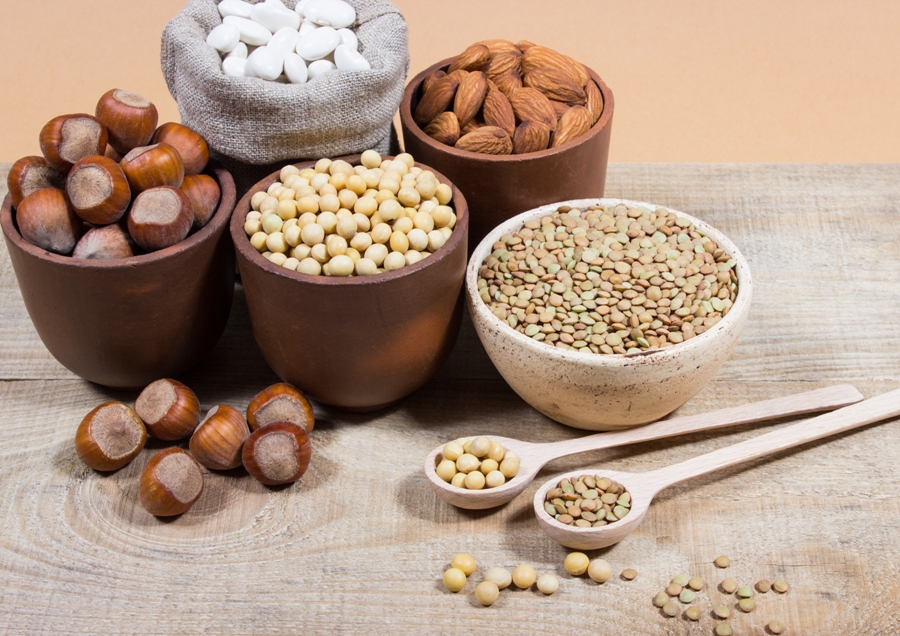You are a vegetarian??? Ohhh!!! How do you meet your protein requirements? One of the most common questions vegetarians get to hear from the non-vegans.
Protein is important to our health, workouts and recovery and our brain function; without it, we wouldn’t function at our best and our bodies wouldn’t be able to support us long-term.
In our earlier articles we have discussed about proteins their importance and the types of protein that exist.
The term “complete protein” refers to amino acids, the building blocks of protein. There are 20 different amino acids that can form a protein, and nine that the body can’t produce on its own. These are called essential amino acids—we need to eat them because we can’t make them ourselves. In order to be considered “complete,” a protein must contain all nine of these essential amino acids in roughly equal amounts.
Yes, meat and eggs are complete proteins, and beans and nuts aren’t. But humans don’t need every essential amino acid in every bite of food in every meal they eat; we only need a sufficient amount of each amino acid every day. Most dietitians believe that plant-based diets contain such a wide variety of amino acid profiles that vegans are virtually guaranteed to get all of their amino acids with very little effort.
If you’re cutting out certain food groups such as meat and fish, you might think your protein options are somewhat limited, but there are lots of options for packing in the nutrients.
Legumes — such as chickpeas, lentils, green peas, soybeans and kidney beans — are common ingredients in Indian dishes. Rich in protein, legumes are also packed with fiber, iron, phosphorous, potassium and B vitamins.
Protein Sources in Vegetarian Diet:
- Dairy Foods
Many protein-rich dairy foods such as milk, yogurt and cheese are commonly incorporated into vegetarian Indian dishes. Calcium-fortified nondairy substitutes, such as soy milk and soy yogurt, are also excellent sources of protein. A cup of milk or soy milk provides about 8 grams, and 1 cup of low-fat yogurt contains about 13 grams of dietary protein. Paneer, a fresh cheese common in Indian cuisine, contains about 7 grams of protein per ounce.
- Lentils
Lentils are a protein favorite of many, especially those on vegetarian and vegan diets looking to pump up the protein fast. Lentils add 9 grams of protein to your meal per half cup, along with nearly 15 grams of fiber!
- Soya and tofu
Soy protein is a very versatile ingredient and can be turned into many different delicious forms. Tofu, for example, is made from the curds of soy milk and can be great when bulking out veggie stir-fries or salads. 100g of firm tofu contains around 8g of protein.
Soya beans themselves can be eaten alone or turned into soy milk, miso or tempeh. Per 100g, soya beans contain around 15g of protein. Although plant and animal proteins are digested in different ways by our bodies, soya is a great veggie substitute for meat and is decidedly adaptable.
- Quinoa
With 8 grams per cup, this gluten-free seed-like grain is a fantastic source of protein, magnesium, antioxidants, and fiber. You can cook it, bake it, and even stir into stir-fry dishes and more.
- Green peas
Packed with protein and fiber, peas are so yummy! They contain 8 grams of protein per cup, so add a little of these sweet treats throughout the day. Plus point about peas is that they are also rich in leucine, an amino acid crucial to metabolism and weight loss that’s hard to find in most plant-based foods.
- Heart-Healthy Nuts
Adding nuts, such as cashews and almonds, is an excellent way to incorporate plant-based protein into vegetarian Indian meal plans. One ounce, or about 23 whole almonds, provides about 6 grams of protein, while a 1-ounce portion of cashews contains just over 4 grams of dietary protein. In addition to being protein-rich, nuts are also excellent sources of heart-healthy fats, dietary fiber and vitamin E.
- Oats and Oatmeal
Oats are an easy and delicious way to add protein to any diet.
Half a cup (120 ml) of dry oats provides you with approximately 6 grams of protein and 4 grams of fiber. This portion also contains good amounts of magnesium, zinc, phosphorus and folate.
Although oats are not considered a complete protein, they do contain higher-quality protein than other commonly consumed grains like rice and wheat.
- Pumpkin seeds
Pumpkin seeds are one of the most overlooked sources of iron and protein out there, containing 8 gram of protein per 1/4 cup. They’re also an excellent source of magnesium as well, not to mention pretty tasty and oh so crunchy.
- Spinach
Filled with 5 grams of protein per cup, spinach is a great leafy green to enjoy as much as you can.
- Broccoli
This lovely veggie contains 4 grams of protein in just 1 cup, which isn’t too bad considering that same cup also contains 30 percent of your daily calcium needs, along with vitamin C, fiber, and B vitamins for only 30 calories.
Conclusion:
Protein deficiencies among vegetarians and vegans are far from being the norm. There are plenty of options for vegetarians to get good quality protein from. It’s essential to understand the requirement of proteins for each individual and then cater to needs.

